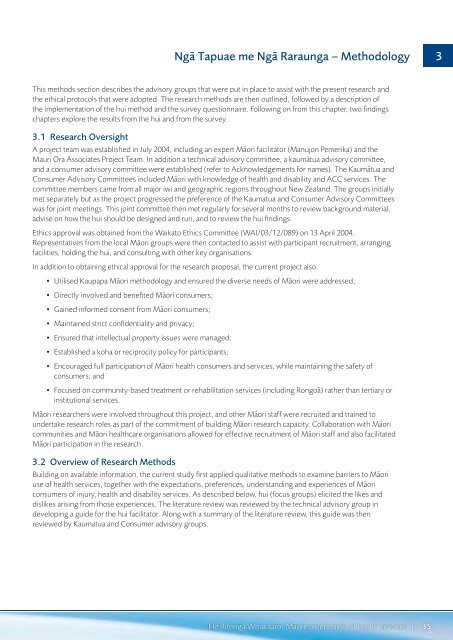He Ritenga Whakaaro - New Zealand Doctor
He Ritenga Whakaaro - New Zealand Doctor
He Ritenga Whakaaro - New Zealand Doctor
You also want an ePaper? Increase the reach of your titles
YUMPU automatically turns print PDFs into web optimized ePapers that Google loves.
Ngā Tapuae me Ngā Raraunga – Methodology 3<br />
This methods section describes the advisory groups that were put in place to assist with the present research and<br />
the ethical protocols that were adopted. The research methods are then outlined, followed by a description of<br />
the implementation of the hui method and the survey questionnaire. Following on from this chapter, two findings<br />
chapters explore the results from the hui and from the survey.<br />
3.1 Research Oversight<br />
A project team was established in July 2004, including an expert Māori facilitator (Manujon Pemerika) and the<br />
Mauri Ora Associates Project Team. In addition a technical advisory committee, a kaumātua advisory committee,<br />
and a consumer advisory committee were established (refer to Acknowledgements for names). The Kaumātua and<br />
Consumer Advisory Committees included Māori with knowledge of health and disability and ACC services. The<br />
committee members came from all major iwi and geographic regions throughout <strong>New</strong> <strong>Zealand</strong>. The groups initially<br />
met separately but as the project progressed the preference of the Kaumatua and Consumer Advisory Committees<br />
was for joint meetings. This joint committee then met regularly for several months to review background material,<br />
advise on how the hui should be designed and run, and to review the hui findings.<br />
Ethics approval was obtained from the Waikato Ethics Committee (WAI/03/12/089) on 13 April 2004.<br />
Representatives from the local Māori groups were then contacted to assist with participant recruitment, arranging<br />
facilities, holding the hui, and consulting with other key organisations.<br />
In addition to obtaining ethical approval for the research proposal, the current project also:<br />
• Utilised Kaupapa Māori methodology and ensured the diverse needs of Māori were addressed;<br />
• Directly involved and benefited Māori consumers;<br />
• Gained informed consent from Māori consumers;<br />
• Maintained strict confidentiality and privacy;<br />
• Ensured that intellectual property issues were managed;<br />
• Established a koha or reciprocity policy for participants;<br />
• Encouraged full participation of Māori health consumers and services, while maintaining the safety of<br />
consumers; and<br />
• Focused on community-based treatment or rehabilitation services (including Rongoā) rather than tertiary or<br />
institutional services.<br />
Māori researchers were involved throughout this project, and other Māori staff were recruited and trained to<br />
undertake research roles as part of the commitment of building Māori research capacity. Collaboration with Māori<br />
communities and Māori healthcare organisations allowed for effective recruitment of Māori staff and also facilitated<br />
Māori participation in the research.<br />
3.2 Overview of Research Methods<br />
Building on available information, the current study first applied qualitative methods to examine barriers to Māori<br />
use of health services, together with the expectations, preferences, understanding and experiences of Māori<br />
consumers of injury, health and disability services. As described below, hui (focus groups) elicited the likes and<br />
dislikes arising from those experiences. The literature review was reviewed by the technical advisory group in<br />
developing a guide for the hui facilitator. Along with a summary of the literature review, this guide was then<br />
reviewed by Kaumatua and Consumer advisory groups.<br />
<strong>He</strong> <strong>Ritenga</strong> <strong>Whakaaro</strong>: Māori experiences of health services | 35

















